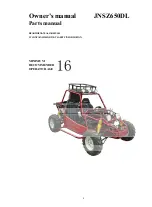
DIVIS
ION I -
SA
FE
TY
! WARNING
Indicates a potential hazard that could
result in a severe injury or death.
21
Sound Judgment
A safe, enjoyable ride is dependent on
many personal choices. An ATV, like all
motorized vehicles, can be dangerous to
operate if you choose to ignore safety
precautions, take unnecessary chances, or
ride beyond your ability or your vehicle’s
capability. Don’t allow the thrill of free-
dom or adventure to affect your ability to
make good, safe choices.
Your Physical Condition
Being physically exhausted is like being
drunk. Try to do something that’s detail-
oriented when you’re really tired, and
you’ll feel totally uncoordinated.
Reckless Riding
If you are involved in an ATV accident
when you’re speeding, you have a 25%
chance of landing yourself in the hospi-
tal. The faster you go, the more likely
you are to destroy your head and internal
organs, and skip the wheelies, jumps,
stunts, and any other showboating.
Laws and Regulations
Any police officer will tell you that igno-
rance of the law is no defense. Your best
defense is to check out your local ATV
laws before riding. It’ll also make sure
that you can continue to ride in your
favorite areas. The quickest way to have
a land area closed is by riding over the
regulations.
Group Behavior
People always do crazier and riskier
things in a group than they would con-
sider doing by themselves. When you’re
ATV riding with others and things start to
get out of hand, decide whether you’re
willing to be injured or see your friends
injured.
SIPDE
By themselves, none of these safe behav-
iors and sound judgments will go very
far. But when you put them all together...
when you’re paying attention to how you
feel, when you’re monitoring the move-
ments of your ATV, and when you’re
constantly evaluating your environment,
then you’re practicing SIPDE. SIPDE is
an acronym that stands for:
Personal Choices
Don’t ride:
1. When you’re tired
S
I
P
D
E
S
CAN/
SEARCH
I
DENTIFY
HAZARDS
P
REDICT WHAT
WILL HAPPEN
D
ECIDE WHAT
TO DO
E
XECUTE THE
DECISION
















































